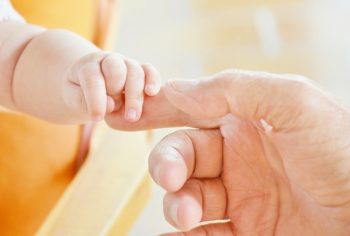Colloquial Spanish Course – Talking about parenthood in Spanish Posted by Laura & Adam on Oct 27, 2020 in Learning, Spanish Culture, Spanish Grammar, Spanish Vocabulary
In this Spanish lesson we are going to practice talking about parenthood in Spanish. First we will learn some relevant grammar and vocabulary and then see if you can follow a short audio conversation in Spanish. The transcript to the audio will be given at the end of the post but please try not to look at it until you have tried playing and understanding the audio a few times.
Talking about parenthood in Spanish:
Criar: To raise
Cuidar: To care for
Dar el pecho: to breastfeed
El bebé prematuro: premature baby
La cesárea: cesarean section
La epidural: epidural anaesthesia
La mochila portabebés: baby rucksack, baby carrier
La lactancia artificial: bottle feeding
La dermatitis del pañal: nappy rash
La crema para irritaciones: nappy cream
El cólico: colic
El pediatra: paediatrician
El bebé: baby, baby boy
La bebé: baby, baby girl
El chupete: dummy, pacifier
El biberón: bottle
El babero: bib
La cuna: cot, crib
El juguete: toy
La muñeca: doll
El peluche: cuddly toy
El cochecito de bebé: pram, baby carriage
La sillita de paseo/carreola: pushchair, stroller
El pañal: nappy, diaper
El orinal: potty
La papilla: pureed baby food
La leche: milk
Llorar: to cry
El cambiador: changer
El embarazo: pregnancy
El osito de peluche: teddy bear
El parto: birth
El postparto: post birth
El potito: jar of baby food
Gatear: to crawl
La casa de muñecas: doll house
La niñera: nanny
Now play the audio to listen a conversation. Can you understand what is being said? Play the audio a few times before you look at the transcript. Don’t worry if you don’t understand every single thing the two people are saying. Try to catch whichever words you can and then try to piece things together to work out what is being said.
(Play the audio a few times before you scroll down and look at the transcript)
Transcript:
María: Aaaaahhhh
John: María, ¿estás bien?
María: Es mi ciática. Me duele tanto.
John: Pobrecita. ¿Hay algo que pueda hacer para ayudarte?
María: No, la verdad es que no. Se me pasará. Estoy bastante acostumbrada. Es muy normal en los últimos meses del embarazo. Lo pasé mucho peor con mi primer hijo.
John: ¿Qué edad tiene Pablo ahora?
María: Aún es pequeño. Casi dos años. Por fin camina bien y hemos dejado de usar la sillita.
John: Mi esposa y yo esperamos cinco años antes de tener a nuestro segundo hijo. Hilary no estaba segura de poder aguantar otro parto.
María: Ya. El mayor dolor que he sentido en mi vida. Pero se te olvida. Y el milagro de la vida es tan tremendo que quieres darle a tu hijo una hermanita o un hermanito.
John: ¿Sabes si vas a tener una niña o un niño?
María: No, preferimos la sorpresa. Vamos a hacer algunas cosas de manera diferente esta vez. La última vez no quise ponerme la epidural, esta vez me la pondré. La última vez no pude dar pecho pero esta vez estoy decidida a hacerlo.
John: ¿Pablo usó un chupete?
María: Por supuesto.
John: Ninguno de nuestros hijos lo usó. A veces nos preguntamos si hubiera sido más fácil. Dormimos muy mal durante los primeros tres años.
María: Lo mejor es dormir con tu hijo en la misma cama. Pablo siempre ha dormido muy bien y nunca nos da problemas a la hora de dormir.
John: ¿Y tu marido?
María: Bueno, sí. Nada es perfecto. A Alberto no le hace mucha gracia dormir en el sofá.
So, how did you get on? How much did you understand of the listening? Please let me know in the comments section below…
Don’t worry if you didn’t understand that much, keep reviewing the vocabulary and phrases and you will soon be up to speed and ready for the next lesson in this course. See you next time!

Build vocabulary, practice pronunciation, and more with Transparent Language Online. Available anytime, anywhere, on any device.




